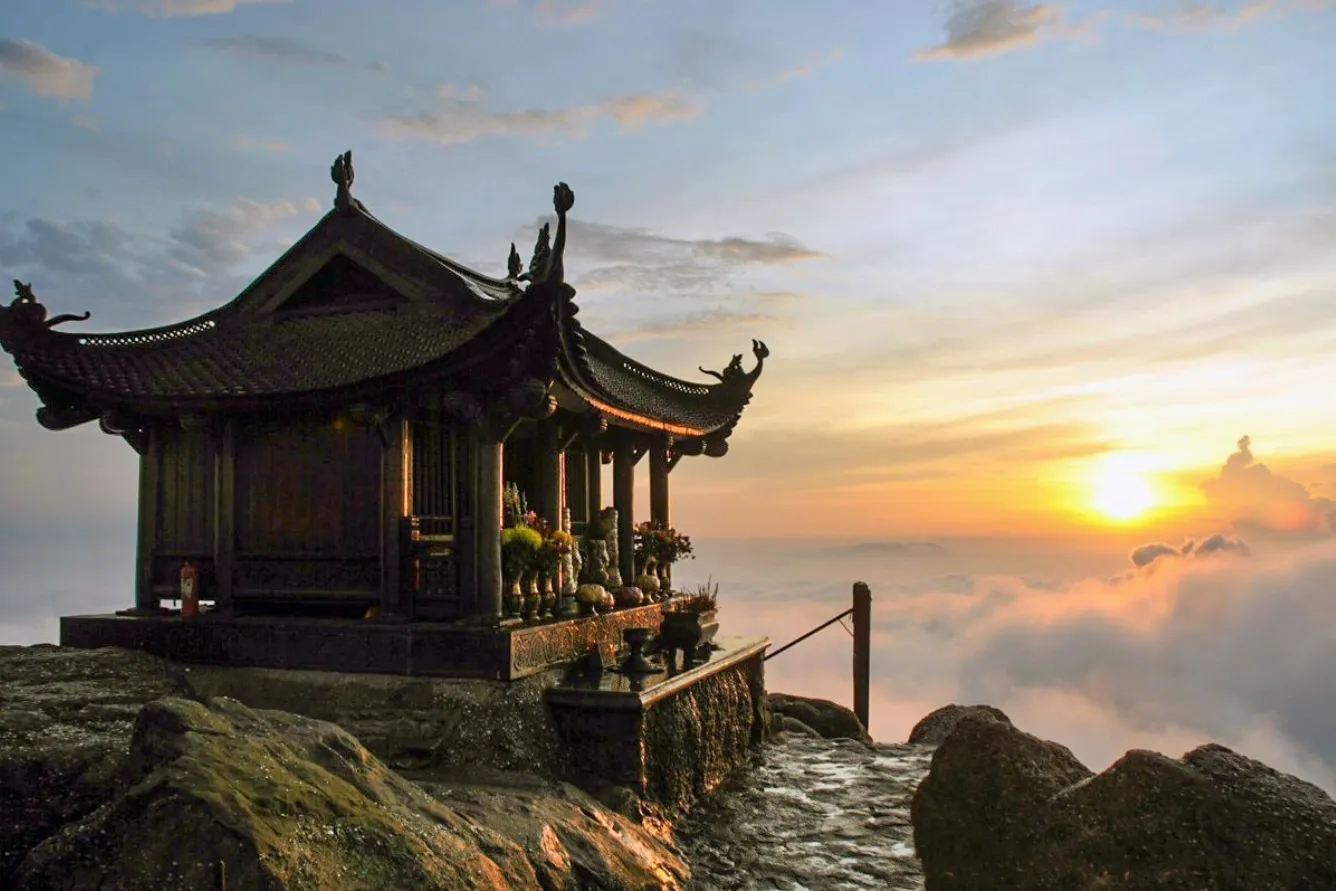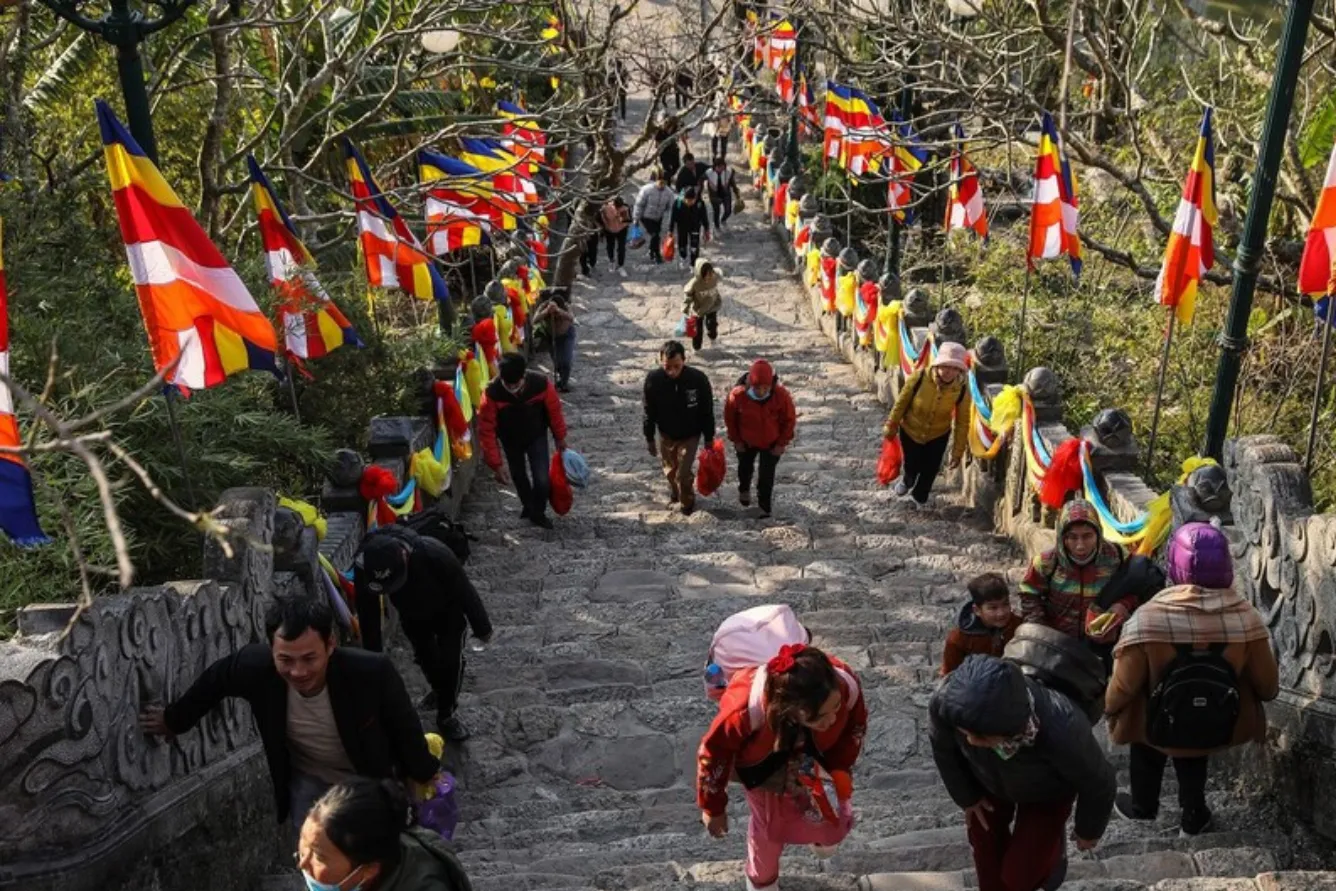Yen Tu, a sacred mountain in Quang Ninh, has long been renowned as the cradle of Truc Lam Buddhism, where King Tran Nhan Tong enlightened Vietnamese Buddhism. Every spring, tens of thousands of Buddhists and pilgrims flock to Yen Tu to attend the festival, immerse themselves in the sacred space, pray for peace, and admire the majestic beauty of the mountains. Yen Tu Festival tourism is not only a spiritual journey but also an opportunity to explore unique cultural and historical values, experience traditional beauty, and enjoy distinctive local cuisine.
Discovering Yen Tu Festival: The Essence of Vietnamese Spiritual Culture
Yen Tu Festival, one of the largest and most ancient festivals in Vietnam, is held annually at the Yen Tu historical and scenic site, located in Uong Bi city, Quang Ninh province. The festival lasts for 3 months in spring, starting from the 10th day of the first lunar month and lasting until the end of the third lunar month. This is the time when Yen Tu puts on a peaceful beauty, with a mild climate, favorable for pilgrims and visitors to visit.
Yen Tu Festival is not only an occasion to commemorate the great merits of King Tran Nhan Tong, the king who renounced the throne to practice and found the Truc Lam Zen sect, but also an opportunity for visitors to learn about the history of Vietnamese Buddhism, admire ancient architectural works, and participate in unique traditional cultural activities. The festival is imbued with spiritual, cultural, and historical values, attracting a large number of domestic and international tourists.
Sacred Origins: The History of Yen Tu Festival
Yen Tu Festival originates from the sacred land of Yen Tu itself, which is known as the “most famous mountain” of Vietnam. Since ancient times, Yen Tu has been a sacred mountain area with Thien Truc Tu Pagoda (also known as Dong Pagoda) located on the mountain peak. The pagoda was built during the Ly Dynasty, with unique architecture featuring copper-tiled roofs and preserving many precious ancient statues. Around the pagoda, there are also the Fairy Chessboard and the word “Phật” (Buddha) carved on the cliff, creating a sacred and mysterious space.
Yen Tu became even more famous and sacred when King Tran Nhan Tong chose this place as a retreat in the late 13th century. After abdicating the throne to his son, King Tran Nhan Tong ascended Yen Tu mountain, established Ngoa Van hermitage for practice, and founded the Truc Lam Yen Tu Zen sect, a Buddhist lineage with a strong Vietnamese identity. Since then, Yen Tu has become the largest Buddhist center of Dai Viet, attracting a large number of Buddhists and pilgrims. Yen Tu Festival is held annually to commemorate the merits of King Tran Nhan Tong and honor the spiritual and cultural values he left behind.
Yen Tu Festival Schedule: Pilgrimage and Experiences
Yen Tu Festival is organized with a methodical schedule, harmoniously combining solemn spiritual rituals and attractive cultural and entertainment activities. Below is a detailed schedule to help visitors easily participate and experience the festival fully:
Preparation Phase: Forest Opening Ceremony
Before the official opening of the festival, the preparation phase plays an important role, starting with the “forest opening” ceremony at Trinh Pagoda (also known as Bi Thuong Pagoda). This ceremony usually takes place on the 9th day of the first lunar month, one day before the festival opening. Monks and local people perform incense offering rituals, chanting sutras, and making offerings to heaven and earth, praying for a peaceful and favorable festival season and peace for everyone. The forest opening ceremony has deep spiritual significance, expressing respect for nature and deities, and asking permission to begin the spiritual journey on Yen Tu mountain.
Opening Ceremony: Solemn and Meaningful
On the morning of the 10th day of the first lunar month, the Yen Tu Festival opening ceremony officially takes place at the Truc Lam Yen Tu Cultural Center. The opening ceremony is the most important event of the festival, attracting the attention of a large number of visitors and Buddhists. The ceremony is solemnly organized with traditional Buddhist rituals such as:
- Rite of praying for national peace and prosperity: Monks and abbots preside over the ceremony to pray for national peace, people’s well-being, and favorable weather.
- Rite of stamping the sacred Yen Tu seal: The Yen Tu seal is a sacred symbol, carrying the meaning of praying for blessings, fortune, and luck. The rite of stamping the seal on paper or cards brings blessings to the recipient.
- Rite of ringing the bell and beating the drum: The sound of bells and drums echoing through the mountains and forests, signaling the official start of the festival and praying for good things.
The festival part takes place vibrantly and bustlingly with unique art programs, with the participation of famous artists from inside and outside the province. Art performances are imbued with traditional cultural identity, praising the beauty of Yen Tu and the Buddhist spirit. The festival atmosphere becomes bustling, attracting pilgrims from all directions to immerse themselves in the unique spiritual cultural space.
Activities After the Opening Ceremony: Diverse and Engaging
After the opening ceremony, Yen Tu Festival continues with many diverse activities, lasting throughout the 3 months of spring. Visitors can participate in the following activities:
- Pilgrimage to worship Buddha: Pilgrims make pilgrimages up Yen Tu mountain to worship Buddha at ancient pagodas, hermitages, and stupas such as Hoa Yen Pagoda, One-Roof Pagoda, Bao Sai Pagoda, Dong Pagoda… Each pagoda has a unique architectural beauty and history, a spiritual destination not to be missed.
- Visiting the Festival Center area: The Festival Center area is where many cultural and artistic activities, local product displays, and unique cuisine take place. Visitors can learn about Yen Tu culture, buy souvenirs, and enjoy local specialties.
- Exploring the pilgrimage village: Yen Tu pilgrimage village recreates the traditional cultural space of the Northern countryside with ancient houses, communal houses, and rural markets… Visitors can experience the daily life of local people, participate in folk games, and enjoy traditional cuisine.
- Participating in folk games: Yen Tu Festival also has many traditional folk games such as throwing conical hats, tug of war, chicken fighting, chess… creating a joyful, lively, and community-bonding atmosphere. The Yen Tu Chess King Tournament is one of the activities loved by many people.
- Watching traditional art performances: Local art troupes and professional artists perform traditional art performances such as dragon dances, lion dances, Cheo singing, Xam singing, traditional martial arts… bringing unique cultural experiences to visitors.
- Climbing Yen Tu Mountain: Climbing Yen Tu Mountain is an indispensable experience when participating in the festival. Visitors can choose to walk on the road or take the cable car to reach the mountain peak. The road to the top of Yen Tu is about 6km long, with thousands of stone steps, winding through pine forests and bamboo forests, bringing majestic natural scenery and a peaceful space. Along the way, visitors can visit ancient pagodas, hermitages, stupas, and Giai Oan stream, which is associated with the tragic story of ancient palace maids.

- Paying homage to Dong Pagoda: Dong Pagoda is located on the highest peak of Yen Tu mountain, known as the “roof of Buddhism in the Northeast”. The pagoda is made entirely of copper, with unique and sacred architecture. Standing on Dong Pagoda, visitors can admire the panoramic view of the majestic Yen Tu mountains and the poetic Ha Long Bay.
Today, the modern cable car system makes conquering Yen Tu peak easier, suitable for many types of visitors. However, many people still choose to hike to experience the spiritual journey, challenge their will, and discover the natural beauty of Yen Tu.
Notes When Traveling to Yen Tu Festival: A Complete Spiritual Journey
To have a complete and meaningful Yen Tu Festival trip, visitors need to note a few things:
- Dress code: Choose polite, discreet clothing, suitable for the sacred space of the festival and pagodas. Avoid wearing clothes that are too short, revealing, or tight. You should choose comfortable shoes for easy movement and mountain climbing.
- Behavior: Maintain a respectful and solemn attitude when participating in the festival and visiting pagodas. Do not swear, curse, or make noise, causing disorder.
- Environmental hygiene: Maintain general hygiene, do not litter indiscriminately. Use public trash cans and protect the natural landscape of Yen Tu.
- Personal belongings: Bring drinking water, snacks, wet wipes, hats, sunglasses, sunscreen, light jackets (if going in the evening or early morning), personal medication…
- Money: Prepare enough cash to spend on sightseeing, eating, shopping, and making donations at pagodas.
- Weather: Monitor the weather forecast before going to prepare appropriate clothing and belongings. Yen Tu weather in spring is quite pleasant, but there may still be drizzle or fog.
- Security: Be careful to protect personal belongings, avoid being pickpocketed or stolen. Comply with the security and order regulations of the festival organizers.

- Book services in advance: If traveling during the festival peak season, you should book services in advance such as hotels, transportation, cable cars… to ensure availability and reasonable prices.
Yen Tu Festival tourism is a journey back to spiritual roots, exploring the majestic natural beauty and experiencing the unique traditional cultural values of Vietnam. Come to Yen Tu to feel the sacred atmosphere, find peace in your soul, and pray for good things for yourself and your family.